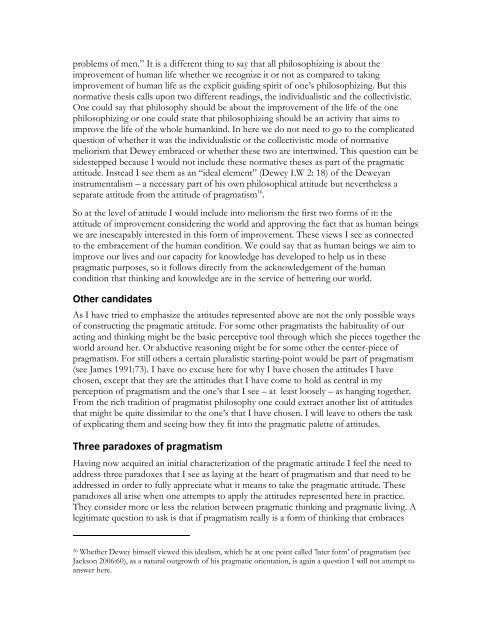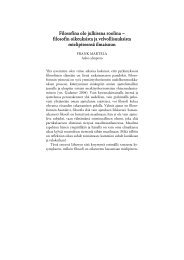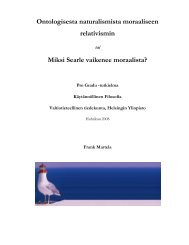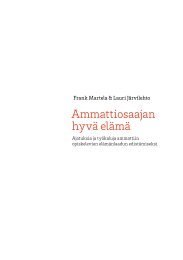Pragmatism as an attitude - Frank Martela
Pragmatism as an attitude - Frank Martela
Pragmatism as an attitude - Frank Martela
You also want an ePaper? Increase the reach of your titles
YUMPU automatically turns print PDFs into web optimized ePapers that Google loves.
problems of men.” It is a different thing to say that all philosophizing is about the<br />
improvement of hum<strong>an</strong> life whether we recognize it or not <strong>as</strong> compared to taking<br />
improvement of hum<strong>an</strong> life <strong>as</strong> the explicit guiding spirit of one’s philosophizing. But this<br />
normative thesis calls upon two different readings, the individualistic <strong>an</strong>d the collectivistic.<br />
One could say that philosophy should be about the improvement of the life of the one<br />
philosophizing or one could state that philosophizing should be <strong>an</strong> activity that aims to<br />
improve the life of the whole hum<strong>an</strong>kind. In here we do not need to go to the complicated<br />
question of whether it w<strong>as</strong> the individualistic or the collectivistic mode of normative<br />
meliorism that Dewey embraced or whether these two are intertwined. This question c<strong>an</strong> be<br />
sidestepped because I would not include these normative theses <strong>as</strong> part of the pragmatic<br />
<strong>attitude</strong>. Instead I see them <strong>as</strong> <strong>an</strong> “ideal element” (Dewey LW 2: 18) of the Dewey<strong>an</strong><br />
instrumentalism – a necessary part of his own philosophical <strong>attitude</strong> but nevertheless a<br />
separate <strong>attitude</strong> from the <strong>attitude</strong> of pragmatism 16 .<br />
So at the level of <strong>attitude</strong> I would include into meliorism the first two forms of it: the<br />
<strong>attitude</strong> of improvement considering the world <strong>an</strong>d approving the fact that <strong>as</strong> hum<strong>an</strong> beings<br />
we are inescapably interested in this form of improvement. These views I see <strong>as</strong> connected<br />
to the embracement of the hum<strong>an</strong> condition. We could say that <strong>as</strong> hum<strong>an</strong> beings we aim to<br />
improve our lives <strong>an</strong>d our capacity for knowledge h<strong>as</strong> developed to help us in these<br />
pragmatic purposes, so it follows directly from the acknowledgement of the hum<strong>an</strong><br />
condition that thinking <strong>an</strong>d knowledge are in the service of bettering our world.<br />
Other c<strong>an</strong>didates<br />
As I have tried to emph<strong>as</strong>ize the <strong>attitude</strong>s represented above are not the only possible ways<br />
of constructing the pragmatic <strong>attitude</strong>. For some other pragmatists the habituality of our<br />
acting <strong>an</strong>d thinking might be the b<strong>as</strong>ic perceptive tool through which she pieces together the<br />
world around her. Or abductive re<strong>as</strong>oning might be for some other the center-piece of<br />
pragmatism. For still others a certain pluralistic starting-point would be part of pragmatism<br />
(see James 1991:73). I have no excuse here for why I have chosen the <strong>attitude</strong>s I have<br />
chosen, except that they are the <strong>attitude</strong>s that I have come to hold <strong>as</strong> central in my<br />
perception of pragmatism <strong>an</strong>d the one’s that I see – at le<strong>as</strong>t loosely – <strong>as</strong> h<strong>an</strong>ging together.<br />
From the rich tradition of pragmatist philosophy one could extract <strong>an</strong>other list of <strong>attitude</strong>s<br />
that might be quite dissimilar to the one’s that I have chosen. I will leave to others the t<strong>as</strong>k<br />
of explicating them <strong>an</strong>d seeing how they fit into the pragmatic palette of <strong>attitude</strong>s.<br />
Three paradoxes of pragmatism<br />
Having now acquired <strong>an</strong> initial characterization of the pragmatic <strong>attitude</strong> I feel the need to<br />
address three paradoxes that I see <strong>as</strong> laying at the heart of pragmatism <strong>an</strong>d that need to be<br />
addressed in order to fully appreciate what it me<strong>an</strong>s to take the pragmatic <strong>attitude</strong>. These<br />
paradoxes all arise when one attempts to apply the <strong>attitude</strong>s represented here in practice.<br />
They consider more or less the relation between pragmatic thinking <strong>an</strong>d pragmatic living. A<br />
legitimate question to <strong>as</strong>k is that if pragmatism really is a form of thinking that embraces<br />
16 Whether Dewey himself viewed this idealism, which he at one point called ’later form’ of pragmatism (see<br />
Jackson 2006:60), <strong>as</strong> a natural outgrowth of his pragmatic orientation, is again a question I will not attempt to<br />
<strong>an</strong>swer here.






